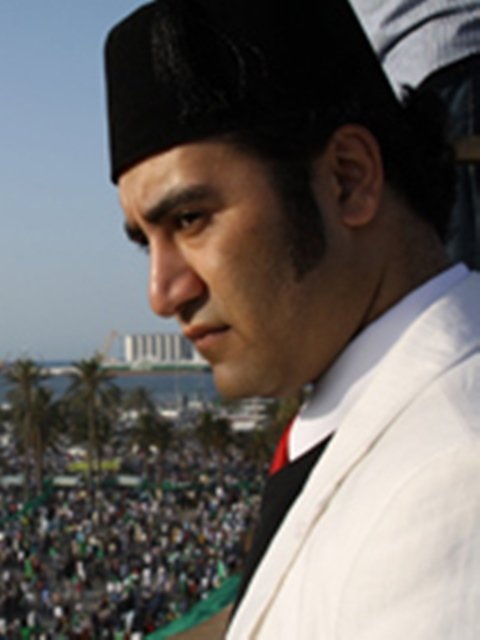Hezbollah fighting in Syria to defend Lebanon from bloodbath
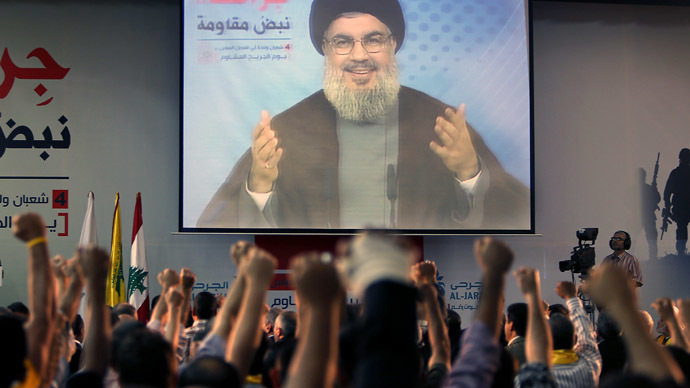
Mainstream media fail to mention that key anti-government forces in Syria swore to kill all the Shiite Muslims and to march straight into Lebanon after Syria.
Sheikh Hassan Nasrallah, Hezbollah’s secretary-general, announced his party’s entry into the Syrian conflict on May 25, 2013. The Syrian National Coalition immediately denounced Hezbollah while the US Department of State reacted to Nasrallah’s announcement on May 29 by demanding an immediate withdrawal of Hezbollah’s fighters from Syria. The rubber stamp Arab League would eventually, and very predictability, condemn Hezbollah’s entry into the Syrian conflict, whereas it has ignored the involvement of Saudi Arabia, Qatar, and their allies.
Qusayr, situated on the road between Damascus and the
Mediterranean coastline of Syria in the northwestern portion of
the Syrian Governate of Homs, would become a central focus of
Hezbollah’s involvement inside Syria. After the victory in Qusayr, the war hawk Charles Krauthammer
would embarrassingly proclaim that the US was hesitating too much
while Russia and Iran were taking charge of the situation in
Syria with Hezbollah.
The US had not hesitated in reality, but had failed to topple the government in Damascus. Most probably prompted by the pressure of their Saudi and Qatari paymasters, Egypt’s Muslim Brotherhood government would react to the victory in Qusayr by cutting its ties with Syria, calling for a no-fly zone, and attacking Hezbollah for its involvement in the Syrian conflict. As an indicator of the failure of its regime change project, the Obama Administration would leak to the press that it was considering a no-fly zone too. Ironically, Egypt’s President Morsi and many of the same people that criticize Hezbollah, Iran, and Russia for their involvement in Syria refuse to criticize Turkish, Saudi, Qatari, British, French, Jordanian, Israeli, and American involvement.
Hezbollah is also a Target of the Syrian Conflict
Undoubtedly Hezbollah did discuss its intentions to enter the Syrian conflict with its patrons in Tehran and coordinated with Iran and then, to a lesser extent, with Russia through Iranian officials and through consultations with Aleksandr Zasypkin, Russia’s ambassador to Lebanon, and then Russian Deputy Foreign Minister Mikhail Bogdanov during his April 2013 visit to Beirut. The involvement of Hezbollah in Syria, however, is purely defensive. Moreover, Hezbollah is one of the last external players to be involved in Syria.
It is the same type of reports that constantly claim there is a
substantial Iranian military presence in Syria, but can never
manage to give solid proof or any form of confirmation about
their claims, that are the ones that simplistically
de-contextualize Hezbollah’s involvement in Syria. For example,
rockets were launched into Dahiyeh, the working class southern
suburb of Beirut that is the political stronghold of Hezbollah in
Lebanon’s capital district, and the town of Hermel, in Bekaa,
hours after Nasrallah announced his party would enter the Syrian
conflict.
Most reports about this failed to recognize the nature of the rocket attacks. The rocket strikes were more than a mere warning from the anti-government forces inside Syria, in fact they were part of a steady stream of escalation that deliberately aimed at expanding the war into Lebanon and spreading the fires of sedition. Attacks were being conducted in areas inhabited by Hezbollah supporters much earlier and before Hezbollah even intervened in Syria. Whether it is done intentionally or unintentionally, this type of reporting conceals the fact that Hezbollah intervened in Syria mainly to protect itself and Lebanon’s diverse population, and it fails to identify who the real perpetrators of the violence are. The mainstream media in places like the US and UK also fails to mention that key divisions of the anti-government forces inside Syria have sworn to kill all the Shiite Muslims they get their hands on, and to march straight into Lebanon after Syria.
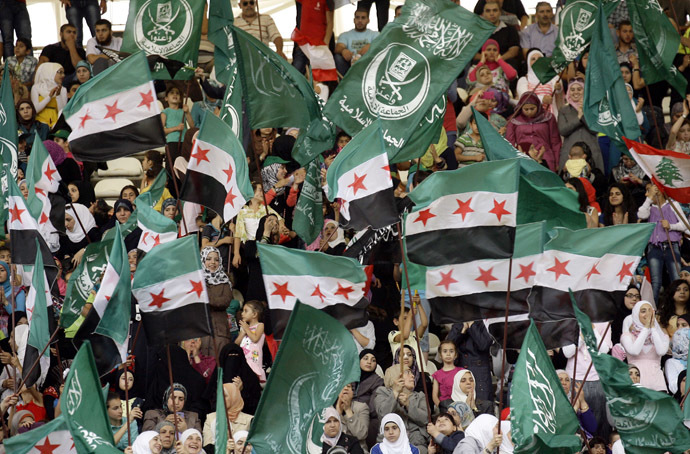
From the beginning of the Syrian conflict Hezbollah agreed that
the Syrian people should have the democratic freedoms that
Hezbollah itself enjoys in Lebanon and it has agreed that Syria
is in need of political reforms. Its entry into the Syrian
conflict is aimed at preventing the takfiri death squads that
have amassed in Syria from marching against Lebanon and
committing the same type of crimes in the towns and homes of the
Lebanese people they have been committing against the Syrian
people. Because the takfiris have announced that they will purge
the Levant of the Shiite Muslims and all others that they do not
accept, the conflict was unavoidable. Rather than wait, Hezbollah
chose to act in a war that the anti-government forces in Syria
deliberately initiated against Hezbollah through a stream of
assaults on the Shiites living on the Lebanese-Syrian border. As
a preview of what is in store for the Shiites, after their defeat
in Qusayr, the anti-government militias marched into Hatla and massacred many of its residents,
including old people and young children who all had their throats
slit. One video of the massacre titled “The storming and cleansing of Hatla”
surfaced with the man filming it stating that all the Shia
Muslims would suffer the same fate. What happened in Hatla,
including stories about vicious rapes and mutilations, has only
strengthened the support in Lebanon for Hezbollah’s intervention.
Hezbollah is protecting Lebanon and the Levant’s minority groups
On July 14, Nasrallah went on Lebanese television to say that
Hezbollah was fighting to defend both the people of Lebanon and
Syria from the abominations of “an American, Israeli and
takfiri project to destroy not only Syria but the entire
region.” Speaking on Al-Manar, he told his supporters and
allies that the entire world had gone to Syria to fight in one
way or another using their money or shipping weapons or through
media warfare. It was only natural for Hezbollah as one of the
main targets of the war to get involved. He added that the
Lebanese government had unfortunately failed to protect the
30,000 Lebanese Christians and Muslims that
have been attacked by the Syrian anti-government forces on their
borders. Hezbollah acted to protect them.
Nasrallah’s sentiments are widely shared inside and outside Lebanon. According to Mohsen Saleh, a professor of political philosophy at the Lebanese University and an expert on Hezbollah, the threat of “takfirism” is now working to terminate all diversity in the region in league with Israel and the US. The Muslim Brotherhood is tied to this project too, but “it is now collapsing and in a state of decay” according to Saleh. “The Brotherhood came into power a hundred years too late,” he told me. While visiting him at his office, he explained that all of Lebanon’s different communities are afraid of the takfiris as they have witnessed their crimes in Syria. This is why the Maronite Catholic Church and the multitude of Christian denominations in Lebanon are increasingly standing behind Hezbollah. He confidently said that all of Lebanon’s different sects will improve their relations with Hezbollah due to the mutual threat they all face. When I asked Saleh about Lebanon’s Prime Minister-designate, who is linked to Hezbollah’s rivals in Lebanon, he pointed out that Tamman Saeb Salam is not a puppet. In a discreet gesture of support distinguishing him from the Hariri camp, Tamman has said that Hezbollah will remain a resistance group no matter what happens due to its intervention in Syria.
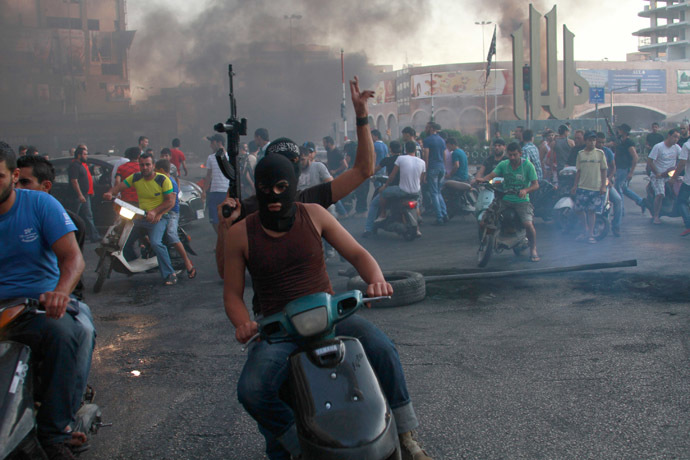
The Druze community, which is the Lebanese group that is the most
vulnerable to a takfiri attack on the country, is reconsidering
its relationship with Hezbollah. The Druze community is also
unhappy about the statements of Walid Jumblatt, its prime
chieftain, which have been supportive of anti-government
activities in Syria. Trying to please his Saudi paymaster in
Riyadh, Jumblatt has gone as far as to say that he personally
supports the Saudi-backed Jubhat Al-Nusra. Well
aware of the dangers to their community, the Druze of Syria have
shunned Jumblatt and continued to support the Syrian
government.
Russian officials have also supported Hezbollah’s stance, Moscow views Hezbollah’s position as one that aims to protect the different people of Lebanon and Syria. Moscow does not want the takfiri brigades to enter the North Caucasus or to attack any of its sister-republics and allies in Central Asia. As opposed to the United States and its allies, Russian foreign policy in the Middle East openly promotes diversity and the protection of Christians and minority groups.
Unlike Hezbollah, the US Does Not Give a Damn about Arab Christians
Dr. Naji Hayek, a Lebanese Christian, sums it all up by stating:
“Hezbollah is fighting for us, for me!” He made the
statement after we watched Michel Aoun live on Orange TV
declaring that he supported Hezbollah after fighting erupted in
the Lebanese city of Sidon. If the takfiris make
inroads into Lebanon, he assured me that he would pick up his gun
and fight too. Hayek, a surgeon, a professor at the Lebanese
American University, and an advisor to Michel Aoun—the leader of
the Free Patriotic Movement, the largest Christian political
party in Lebanon—helped draft the Syria Accountability and
Lebanese Sovereignty Restoration Act and used to submit
intelligence reports about Syrian activities in Lebanon to the US
Senate. He was once a member of Lebanon’s National Liberal Party
and a close friend of Samir Geagea, the Christian warlord
extraordinaire allied to the US and Saudi Arabia. Hayek was even
injured while fighting against the Syrians for Michel Aoun.
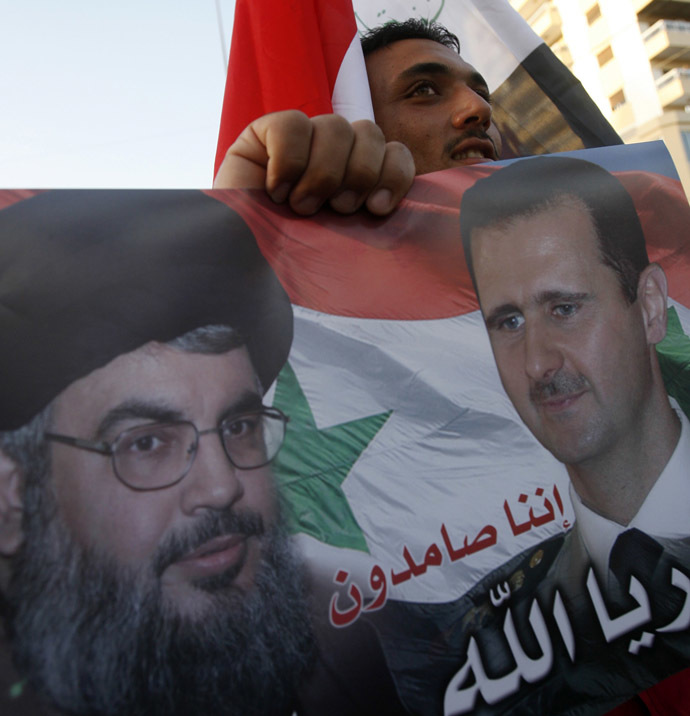
Things have changed since then and new alliances have formed. Syria is an enemy no longer and Samir Geagea is no longer a friend. Hayek told me bitterly that the US has never hesitated to manipulate and then drop the Christians in Lebanon. He even showed me a heated email exchange between him and Jeffrey Feltman, while Feltman was serving as a US assistant-secretary in the US State Department, where Feltman in reference to Hezbollah accused the Free Patriotic Movement of being aligned with “evil.” In retrospect, Hayek realizes that the US had different motives when the Syria Accountability and Lebanese Sovereignty Restoration Act was drafted. Furiously, he talked about “the twenty-five year old kids working at the Lebanon Desk in the [US] State Department with [Bachelor of Arts] in history” that are disconnected from reality in the Middle East which he has had to deal with.
“I am not a fan of Bashar Al-Assad, but I support him one
hundred percent, because the alternative in Syria is an extremist
government,” Hayek emphasized. Should the Syrian government
fall, Hayek’s fear was that the corrupt Hariri family and the
March 14 Alliance would invite a Muslim Brotherhood government in
Damascus to invade and occupy Lebanon. As a key interlocutor
between Michel Aoun and the United States, he explained to me
that the Hariri family had no problem with the Syrian presence in
Lebanon and in fact they were opposed to a Syrian withdrawal from
Lebanon and would obstruct his work in the United States. He
explained that the reason for this was that the Hariris used the
Syrian military to enforce their hegemony in Lebanon. “Hariri
corrupted the Syrians,” he explained. The Hariri clan would
bribe all the high ranking Syrian officers in Lebanon by paying
them millions of dollars. The problems between the Hariris and
Syria began when Bashar Al-Assad wanted to put an end to
corruption in Syria and refused to let the Hariris continue with
their game.
The statements, views and opinions expressed in this column are solely those of the author and do not necessarily represent those of RT.
The statements, views and opinions expressed in this column are solely those of the author and do not necessarily represent those of RT.
